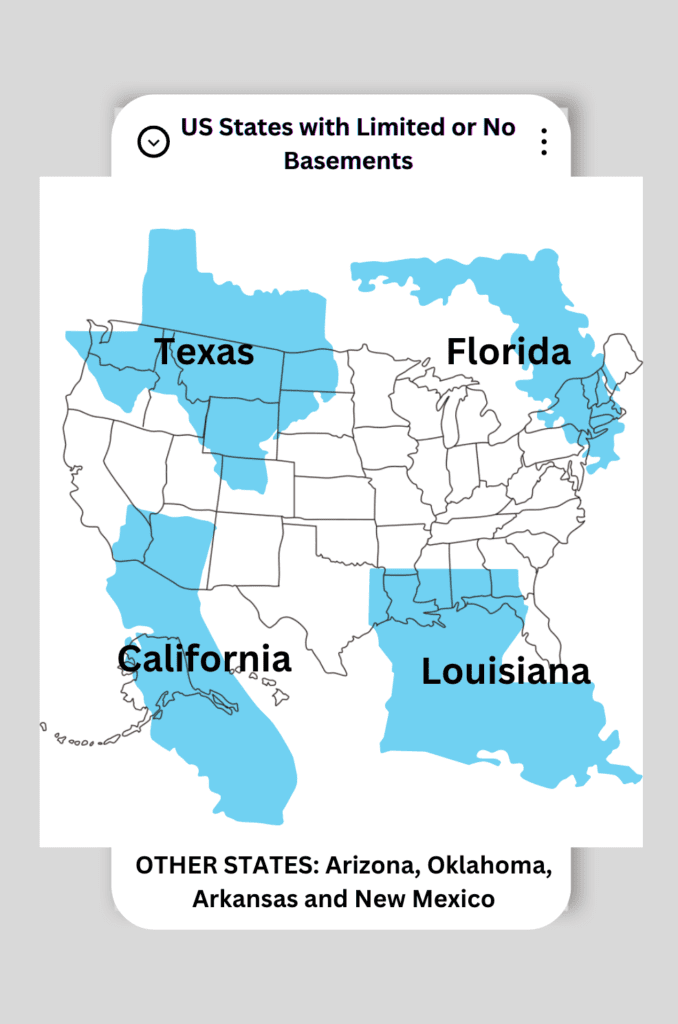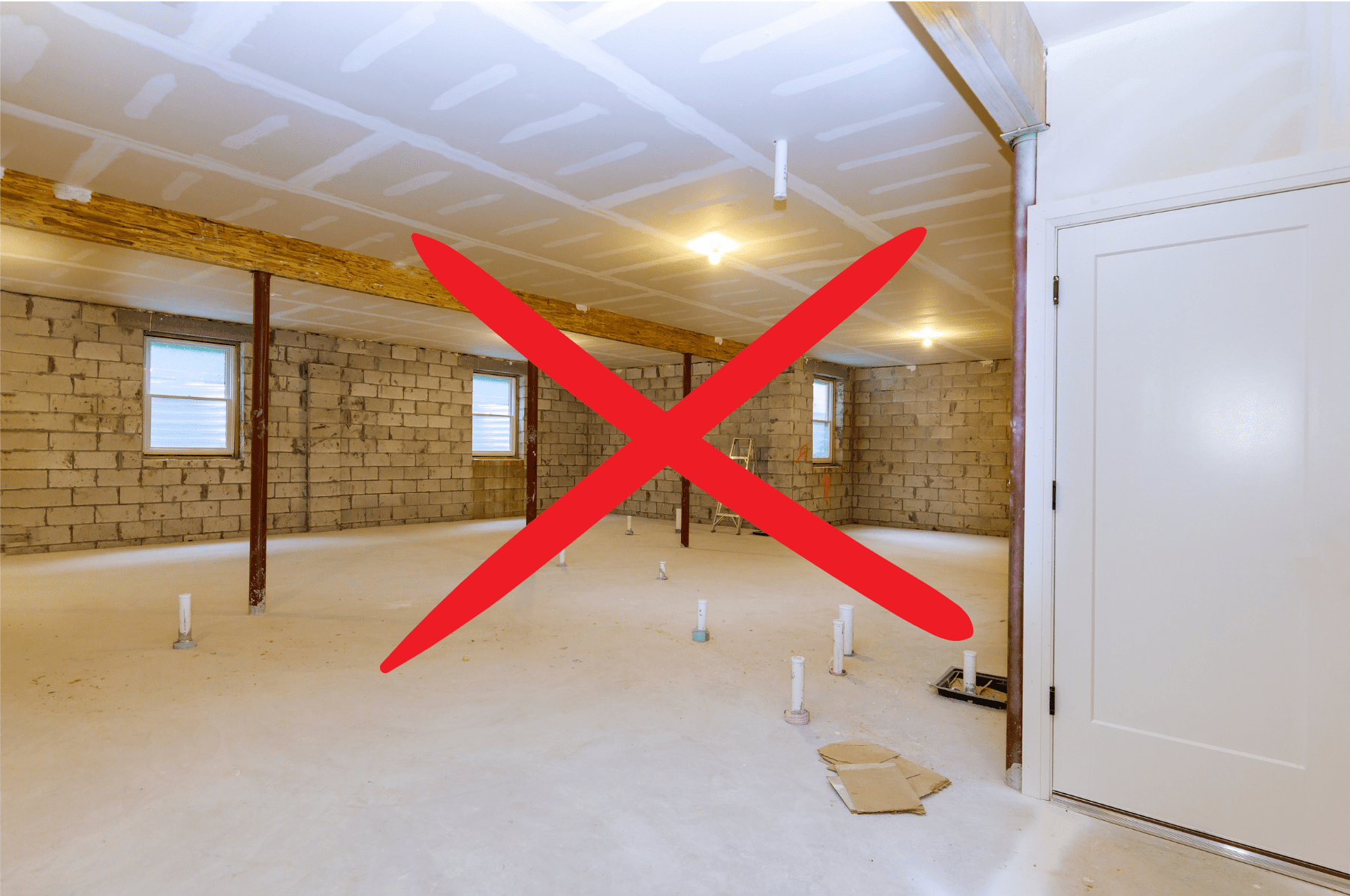You might be very familiar with basements, those spaces under some houses. But not everyone has come across them. Why? Well, they might not even be available where they live.
If you’re considering getting a new house or building one, it’s important to know that not all houses have basements. The number of basements in different parts of the United States depends on things like the type of soil, the climate, the rules for building houses, and what people in that area like.
In this blog post, we’ll look at these factors and find out which states don’t typically have basements.
Factors that Influence Basement Construction
Soil and ground conditions
Soil and ground conditions are really important when it comes to building basements. Some types of soil, like clay that expands and shrinks, can cause problems for a house’s foundation when it gets wet or dry. If the ground has a lot of water in it, basements might flood or get damp, which can be a serious problem. Also, how deep the bedrock is and what it’s made of can change how easy or expensive it is to dig a basement.
Climate and weather
The climate and weather in an area can affect whether or not a basement is a good idea. In places with really hot or cold temperatures, basements can help keep the house comfortable and save energy. But in areas with a lot of flooding or hurricanes, having a basement might be risky, so people might not build them.
Building rules and local laws
The rules for building houses and local laws can also change how basements are built. In some places, there are strict rules about how deep the foundation has to be or what materials should be used. These rules could limit the options for basements in those areas.
Cultural preferences and historical trends
What people like in a certain area and the history of that place can affect whether basements are common or not. In some places, basements have never really been popular because of the way houses were built or local traditions, which still affect how houses are built today.
In states like Arizona and New Mexico, people often build houses in the adobe style. Adobe houses are made from natural materials like dirt, clay, and straw, and they usually don’t have basements. This style of building is still popular in these states.
In states like Georgia and South Carolina, houses were often built on piers or raised off the ground in the past. This was done to protect the homes from floods, bugs, and dampness, and basements weren’t part of the design. This historical trend still affects how houses are built in these areas today.
Mediterranean-style homes: In places like California or Florida, with a strong Mediterranean influence, houses are often built with shallow foundations and no basements. This style focuses on open floor plans, outdoor living spaces, and special features like stucco walls and clay roofs. People’s love for this style has led to fewer basements in these areas.
US States with Limited or No Basements

Let’s go over a list of states where basements are limited or virtually nonexistent.
Texas
Texas has clay soils that can cause problems for house foundations because they expand and shrink. The state’s hot weather and occasional flash floods also make basements less attractive.
Florida
Florida has sandy soil and limestone bedrock, which make building basements difficult. The state also has a high water table and is prone to flooding, so basements aren’t popular there.
California
In California, there are different types of soil and a lot of earthquakes, which make it harder to build basements. Strict building codes to make sure houses are earthquake-resistant also lead to fewer basements.
Louisiana
Louisiana has soft soils that make building basements tricky. The state’s low elevation and risks of floods and hurricanes make basements less practical and safe.
Other States
Arizona, Oklahoma, Arkansas, and New Mexico are among the states that feature few or no basements. Arizona’s dry climate and soil conditions limit basement construction, while Oklahoma’s clay soils present challenges for building basements.
The composition of Arkansas’ soil, elevated water tables, and its comparatively mild climate do not create favorable conditions for constructing basements. In New Mexico, the prevalent adobe-style houses typically exclude basements from their design.
The Future of Basements in the US
New building technology might change basement trends. Cool waterproofing methods can help stop basements from getting wet and protect them from floods. Plus, safer designs during earthquakes can make basements a better choice in areas with lots of earthquakes.
Changes in building rules and laws could make basements more or less popular. If there are stricter rules for saving energy, basements might become more popular because they help insulate houses. On the other hand, if there were more rules about building in flood zones, people might not want to build basements.
How people feel about basements will also affect their popularity. As families look for more flexible spaces in their homes, basements might become more popular because they can be used for many different things. This could lead to more people building basements all over the US.
Conclusion
To sum it up, states like Texas, Florida, California, Louisiana, Arizona, Oklahoma, and New Mexico don’t have many basements, or any at all, for different reasons.
It’s important for people who want to buy or build a house, as well as builders and architects, to know about the differences in basements from one place to another.
If you’re thinking about building a basement, make sure to look into the local conditions, rules, and trends. This will help you make smart choices and create a safe, useful space that works for you.
Video Version of the Blog Post
We have created a video version for this blog post. If you like this video, consider subscribing to the House Notebook Youtube Channel.


I grew up on Long Island. During the years of raising children, a basement is imperative. One can start with a rec room, laundry room & a room for a boiler,hot water tank,& a mass of wires & cables concealed cleverly by a dropped ceiling. When children do their college,rear their own children-a basement easily converted to an apt can bring in a much needed income for the empty nesters. Get it?
I’m not a politician, thus I can only suggest you try to live in a state,like myself, being New York,where basements are not proscribed. BYE-BYE